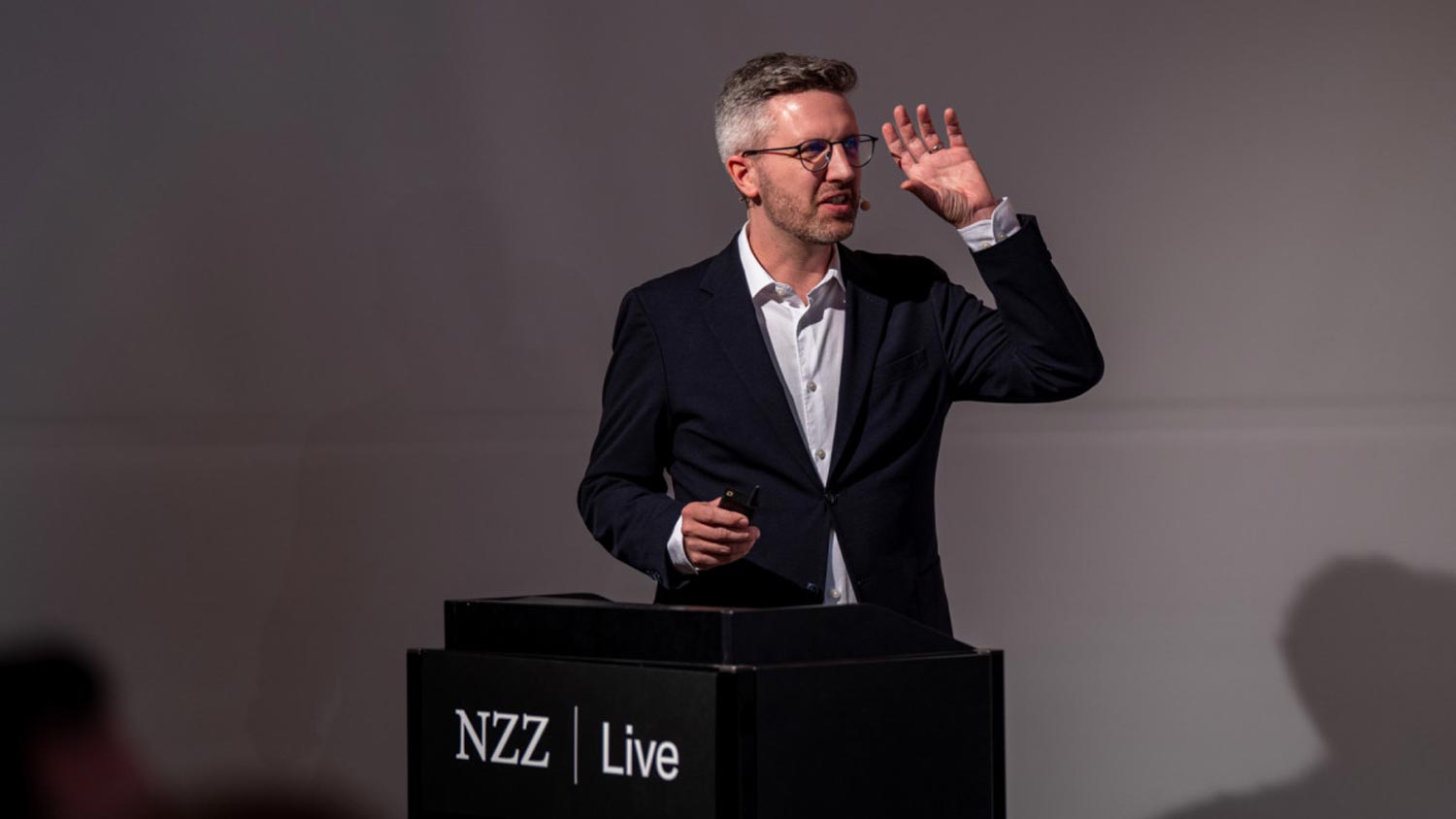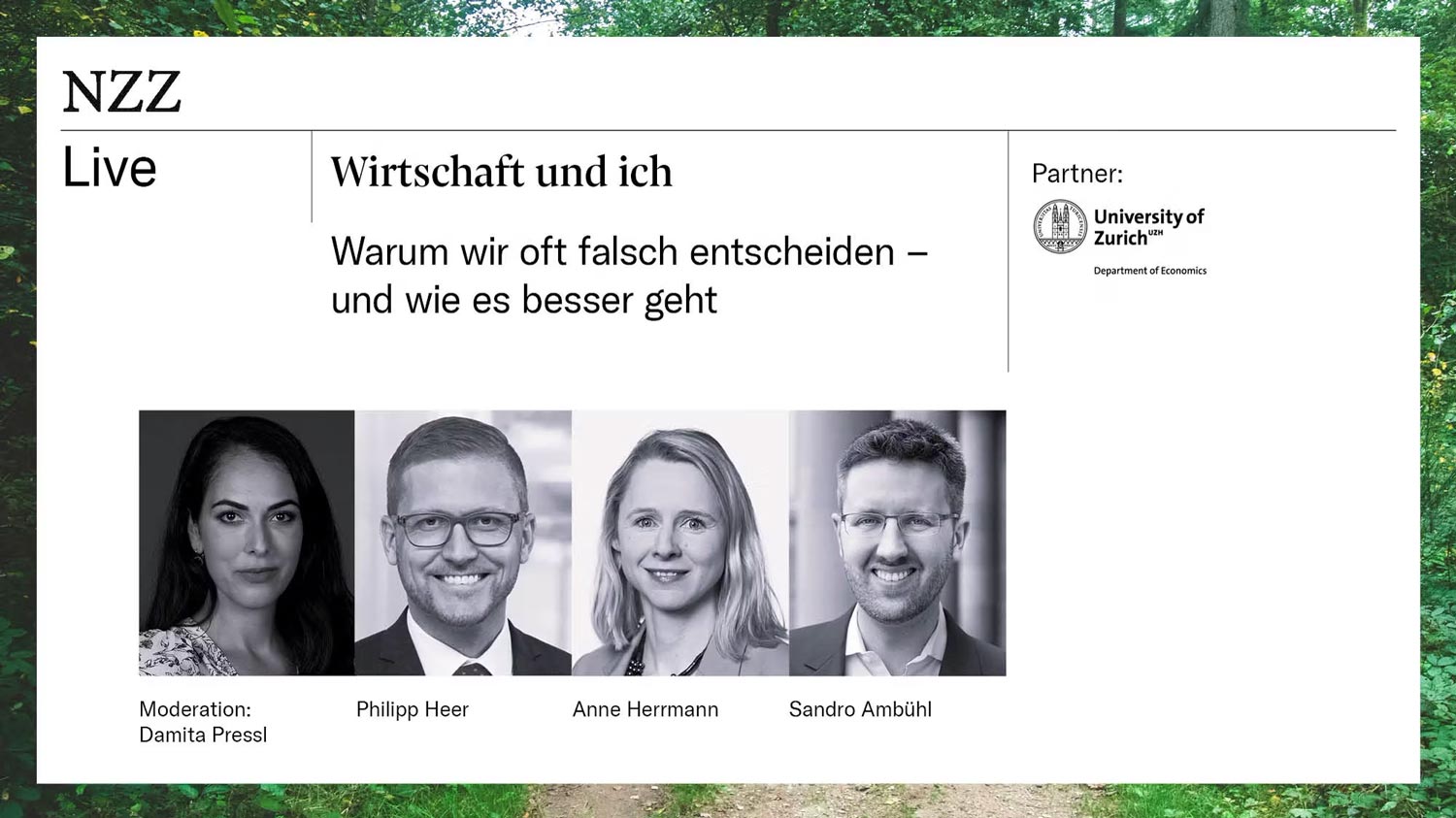Financial education
In his recent presentation at NZZ Live, UBS Foundation Professor Sandro Ambühl shows how common wisdom can lead us astray when making financial decisions.
Using three key mistakes, he explains how we can make better financial decisions based on scientific evidence and with long-term benefits.
Mistake 1: Inadequate retirement savings - underestimating compound interest
The saying “Live every day as if it were your last” can be fatal when it comes to saving for retirement. Many people underestimate the power of compound interest. The so-called rule of 72 helps: If you divide 72 by the annual interest rate, you get the approximate number of years it takes for an investment to double. With an average return of 7%, an investment doubles approximately every 10 years. While a return of 7% sounds high, it is the inflation-adjusted return that investors could historically expect on the stock markets. So, if you invest CHF 100,000 at the age of 35, you can expect to end up with around CHF 800,000 by age 65. Anyone who forgets the compounding and wrongly assumes that interest is only paid on the principal will think that the investment will only grow to CHF 310,000. This is a huge difference.
The result: people who do not understand the compound interest effect save significantly less for old age.
Mistake 2: Not participating in the stock market - need for security with high costs
“Better safe than sorry” is advice that leads many people to avoid stock markets, at huge costs to themselves. At historical returns of around 7% per year, stocks are significantly more profitable in the long term than, for example, safe bonds with 2%. The rule of 72 shows that with a return of 2%, it takes 36 years for an investment to double. The 35-year-old who invests his CHF 100,000 in bonds with a 2% yield will therefore have less than CHF 200,000 at 65, whereas he could expect CHF 800,000 if he were to invest the money in the stock markets. The price of caution? An incredible CHF 600,000 – three quarters of the capital an equity investor could expect to have.
The consensus in financial market economics is that even risk-averse households should invest a part of their assets in the stock market. Not in individual companies, but in broadly diversified index funds, which yield the same return at significantly reduced risk.
Mistake 3: Neglecting costs - high fees eat up returns
“You get what you pay for” may apply in everyday life, but the opposite is often true for financial products. Most investment funds fail to consistently beat the markets. But trying to do so costs a lot. Compared to the cheapest products, which cost less than 0.2% per year, seemingly acceptable fees of 2.4% per year can halve your long-term capital. Example: If you invest CHF 100,000 over 30 years at a gross return of 7.2% and a cost of 0.2%, you end up with CHF 800,000. The fee of 2.4% reduces the return to 4.8%, which means that the capital only doubles once every 15 years according to the rule of 72. After 30 years, therefore, only CHF 400,000 remains.
Better: broad, low-cost index funds. Or as John Bogle, founder of the first index fund, said: “In investing, you get what you don't pay for.”
Conclusion: financial education instead of worldly wisdom
Proverbs such as “no pain, no gain” apply broadly, but are often poor guides in financial decisions. Sandro Ambühl shows that with a little understanding of returns, risk, and costs, we can make more informed decisions that pay off in the long term. Financial education—and a little behavioral economics—have been proven to lead to better and more profitable investment results.
Read the corresponding NZZ article (in German) here.
In his recent presentation at NZZ Live, UBS Foundation Professor Sandro Ambühl shows how common wisdom can lead us astray when making financial decisions.
Using three key mistakes, he explains how we can make better financial decisions based on scientific evidence and with long-term benefits.
Mistake 1: Inadequate retirement savings - underestimating compound interest
The saying “Live every day as if it were your last” can be fatal when it comes to saving for retirement. Many people underestimate the power of compound interest. The so-called rule of 72 helps: If you divide 72 by the annual interest rate, you get the approximate number of years it takes for an investment to double. With an average return of 7%, an investment doubles approximately every 10 years. While a return of 7% sounds high, it is the inflation-adjusted return that investors could historically expect on the stock markets. So, if you invest CHF 100,000 at the age of 35, you can expect to end up with around CHF 800,000 by age 65. Anyone who forgets the compounding and wrongly assumes that interest is only paid on the principal will think that the investment will only grow to CHF 310,000. This is a huge difference.


Economics and me
With the UZH Department of Economics as a content partner, the NZZ Live event series Wirtschaft und ich (in German) gets to the heart of topics and studies from the field of economics: How does economics affect me? In 90 minutes, experts from academia and research at the UZH Department of Economics share their knowledge. They show how economic insights are important for our daily lives and how they influence the decisions we make every day.
With the UZH Department of Economics as a content partner, the NZZ Live event series Wirtschaft und ich (in German) gets to the heart of topics and studies from the field of economics: How does economics affect me? In 90 minutes, experts from academia and research at the UZH Department of Economics share their knowledge. They show how economic insights are important for our daily lives and how they influence the decisions we make every day.

Contact
Sandro Ambühl obtained his PhD in economics from Stanford University in 2016. He joins the UBS Center from his previous position as Assistant Professor of Economics at the Department of Management, UTSC, and the Rotman School of Business, University of Toronto. One focus of Sandro's research studies how to help people make good financial decisions. A second strand of research concerns policies for the exchange of goods about which people have ethical intuitions, as is the case, for example, with incentives for vaccine uptake or clinical trial participation. He addresses these questions using a combination of controlled experiments and economic theory. In 2017 he was awarded the Alfred P. Sloan Foundation grant “Using Behavioral Welfare Economics to Improve Financial Decision Making”. In 2022, his article "What Motivates Paternalism? An Experimental Study" (with B. Douglas Bernheim and Axel Ockenfels) was awarded the Exeter Prize for the best paper published in the previous calendar year in a peer-reviewed journal in the fields of Experimental Economics, Decision Theory and Behavioural Economics.
Sandro Ambühl obtained his PhD in economics from Stanford University in 2016. He joins the UBS Center from his previous position as Assistant Professor of Economics at the Department of Management, UTSC, and the Rotman School of Business, University of Toronto. One focus of Sandro's research studies how to help people make good financial decisions. A second strand of research concerns policies for the exchange of goods about which people have ethical intuitions, as is the case, for example, with incentives for vaccine uptake or clinical trial participation. He addresses these questions using a combination of controlled experiments and economic theory. In 2017 he was awarded the Alfred P. Sloan Foundation grant “Using Behavioral Welfare Economics to Improve Financial Decision Making”. In 2022, his article "What Motivates Paternalism? An Experimental Study" (with B. Douglas Bernheim and Axel Ockenfels) was awarded the Exeter Prize for the best paper published in the previous calendar year in a peer-reviewed journal in the fields of Experimental Economics, Decision Theory and Behavioural Economics.